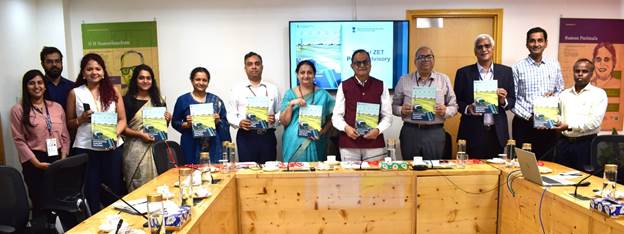New Delhi, Delhi, 21st of August, 2024 : Prof. Ajay Kumar Sood, Principal Scientific Adviser (PSA) to the Government of India, launched the advisory document titled “Bharat Zero Emission Trucking (ZET) Policy Advisory” at Vigyan Bhawan Annexe, New Delhi today (August 21, 2024). The event was joined by Dr. Parvinder Maini, Scientific Secretary, Office of PSA; Sh. Hanif Qureshi, Additional Secretary (Auto), Ministry of Heavy Industries; Sh. Sudhendu Sinha, Adviser (Infrastructure Connectivity & E-Mobility), NITI Aayog; Prof. Shankar Ram, IIT Madras (Member, Consultative Group on e-Mobility (CGeM)); Sh. M. Ravi, Chief of Operations, Centre of Excellence for Zero Emission Trucking (CoEZET), IIT Madras; Ms. Sharvari Patki, Program Head, Electric Mobility, World Resources Institute (WRI); and Ms. Chandana K., Program Associate – Sustainable Cities & Transport, WRI.
In his opening address, PSA Prof. Sood emphasized the importance of Zero Emission Trucks (ZET) for both decarbonization and energy security and said, “The induction and wider adoption of ZETs require technical expertise and systematic policy interventions to create an enabling techno-socio-economic ecosystem in India.”

Prof. Karthick Athmanathan, PSA Fellow and Professor of Practice, IIT Madras set the context of the Bharat ZET Policy Advisory document and Ms. Patki presented a brief overview of the document outlining the approach and methodology of arriving at the policy interventions.
Sh. Hanif Qureshi, Additional Secretary (Auto), Ministry of Heavy Industries and Sh. Sudhendu Sinha, Adviser (Infrastructure Connectivity & E-Mobility), NITI Aayog also spoke on the occasion and highlighted the need for the electrification of trucks and discussed the way forward to fully transition to ZETs to reach 100% ZET sales penetration by 2050, which is essential to achieve India’s ambitious Net Zero 2070 target.
The Bharat ZET Policy Advisory document has been conceived as a dynamic document, outlining a comprehensive set of 30 policy interventions designed to accelerate ZET adoption in India. These interventions are categorized into five key areas: incentives, regulations, infrastructure, business and financing, and stakeholder-centric initiatives. Each policy intervention identifies a nodal agency responsible for implementation, a list of key stakeholders, its impact on the sector, and the methodology of policy formulation. These recommendations will be further refined through extensive stakeholder consultations, including detailed cost-benefit and impact analyses by the concerned ministries, departments, and institutions.

The development of this advisory document was steered and guided by a Policy Advisory Panel (PAP) constituted by the Office of the PSA. A Project Management Unit was established at CoEZET, IIT Madras to draft the policy advisory document under the guidance of the PAP. The PAP is chaired by Dr. Preeti Banzal, Adviser, Office of PSA, and vice-chaired by Prof. Karthick Athmanathan, PSA Fellow. The panel also includes Dr. Reji Mathai, Director, Automotive Research Association of India; Sh. S.A. Sundaresan, Vice President and Head (New Technologies), Ashok Leyland Ltd.; Sh. Sushant Naik, Global Head of Government and Public Affairs, Tata Motors Ltd.; Sh. Pawan Mulukutla, Executive Program Director – Integrated Transport, Clean Air and Hydrogen, WRI India; Sh. Karthikey Hariyani, Chief Executive Officer, TecSo ChargeZone Ltd.; Sh. D.M.R. Panda, General Manager-Hydrogen & Renewable Energy, NTPC; Prof. S.A. Soman, Department of Electrical Engineering, IIT Bombay; Sh. Saurabh Sood, Senior Transport Specialist, World Bank; Dr. Sneha Malhotra, former Chief Technology Officer, Office of PSA; and Sh. Rajesh S, Chief Executive Officer, CoEZET, IIT Madras.










More Stories
Ashoka One Mall Announces Republic Day Sale.
Republic Day Tableau In New Delhi : The Theme Of Tripura’s Tableau 2025 “Cultural Diversity Of India”.
Parents Are Focusing On Facilities Rather Than Faculties”: CA Mohan Mattupalli, Master Minds!